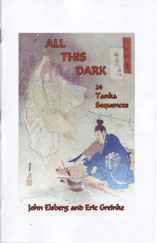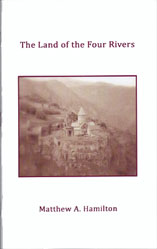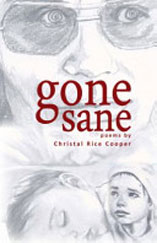
|
|
 updated: April 6, 2015
|
|
Umber (or umbra), which is all at once the pigment, or vibrancy, the firey emblem of a life at its peak, is also a shadow, or ghost, an emblem of what once was. That the leaf was reduced to powder, to ash, is the perfect allusion to the end of an affair, to the end of the allusion of love. And the allusion does not end there. With each new story, we glean a new piece of the puzzle, as if it were possible to reassemble the affair into what it once was, or, at the very least, into something meaningful, more than just a memory. However, with each new envelope that arrives in the mail, the conflicts in the relationship are revealed and the image begins to fray. In the mail, the narrator, Kitty Kat, receives kite string, hair from a carousel horse, holly, a silk scarf, all of which inform us more of the varied and complicated fabric of the life they shared together. In one of the most telling moments in the book, in the story "Communion," she receives "a silver cross . . . nailed on a bed of maroon satin" (41). The cross affixed to the fabric like a kite frame, as if to say all faith in all relationships will fall short its final destination regardless of the strength of the breath that hoisted it, never breaking the clouds where midnight passes, never ascending to the spiritual realm, the realm of uncompromised adoration and exaltation. Never reaching heaven. The perfect metaphor for Kitty Kat's own emotional state, who is still tethered to the man to whom she is married to be able to fully commit to M. In fact, Kitty Kat herself is even likened to a kite in the story, "The Party." After receiving an art post card from M of the painting "Above the Clouds Midnight Passes," where he explains "he cannot step foot in the gallery" (5) again, an obvious declaration to the state of their affair, Kitty Kat "hug[s] the wall a moment. Then slid[es] down sitting on the floor" (5). In this moment, she is both kite and the passing darkness of night, both the empty grasp at bliss and the emptiness itself. And, if there were any doubt of Tepper's intent with this image, she draws the connection for us in her own words through M in "Kites:"
The final divination and exploration of tension and balance happens, appropriately, at the very end. Of course, in every relationship that shapes us, the end is never really the end, where the memory of the feelings of love is always measured against its absence, and it is its absence that we inhabit. In the last story, "Grafted," even the title itself speaks to this inhabitance, to the way our lives grow and fuse together while simultaneously growing apart. In the final moments of "Grafted," M insists that Kitty Kat "Hold on to that blue. Look at those clouds how they puff. Remember these leaves" (50), a wish that brings us back to the beginning of the book, to the very first story, and the clearest sign that she "would remember everything" (50) despite and because of "the few veins that remain" (3). Order From the Umberplatzen from:
Susan Tepper's Website
Poetry in Ink: on White Papers, by Martha Collins
|
Poetry is always interested in time and space…It is also interested in time specified-in history. Especially for nations
emerging from colonial status…history needs to be made freshly significant, newly sacred…Immediate challenges arise for a
lyric poet who is writing a poem about (or within or against) history…written history…is not only narratively complicated,
but always politically disputed. |
Speechless poetry: a paradox. An oxymoron. Or, say, one powerful effect poetry can have is its evocation of what is meant beyond the words themselves. The ineffable: some say the ultimate task of great poetry, saying that which cannot be said. Registering silence, the note of pain, perplexity underlying the whole equality of meaning, the pros and cons, the why's and why-not's, the lefts and rights of any issue deeply affecting us. This is what Rolland Barthes called the zero degree of writing. A truly honest consideration of any pressing topic cannot finally decide or judge with certainty.
In a good attempt at such a difficult subject as race and white privilege in American history, in a passage from White Papers, her new book of poetry, Martha Collins writes:
On his way to the Capitol largely built by slaves
who baked bricks, cut, laid stone-
to stand before the Mall where slaves were held
in pens and sold-
on his way to the White
House partly built by slaves, where another
resident, after his Proclamation, wrote:
If slavery is not wrong, nothing is wrong. (p. 62)
Who today would argue against the statement? On the very next page it is to Collins' talent to juxtapose the expression of what a total leveling of uppercase writing implies:
when an other, a one
you've capitalized upon,
rightly decides to capitalize
itself, should you capitalize
yourself as well as the other
to remind yourself you have
what you've never fully
acknowledged: a race, a place
in an unbalanced history
…
you keep lowercasing
yourself, but now you can't decide
what to do about the others: you
wonder whether someday we
might capitalize no one, nothing at all (p. 63)
Her argument at this deliberating finale of the book, is for ink to capture, memory historically printed, individually imprinted, which alone retains the many possible meanings of this restated term to "capitalize," to write in the uppercase, to make important, to profit from, to put into the Capitol, to punish ultimately… Maybe E.E. Cummings first made the statement with his lowercase "i": who wants to be capitalized?
It's a wonderful and rare talent that produces poetry eliciting so much thought and feeling yet leaves the reader herself virtually at a loss for words. A poet and critic once noted that great poetry communicates before it is understood. The poetry of that poet subtly informs this book by Collins. The compositional touchstones of doubt moving to resolution, the "Because" and "Although" of T.S. Eliot's "Ash Wednesday" polarize the passionate personal debate of White Papers:
Because my father said Yes
but not in our lifetimes Because
my mother said I know my daughter
would never want to marry… (p. 1)
although my father although
my mother although we rarely
although we whispered… (p. 64, final page)
Collins' concern, however, is social and historical rather than inspirational. Technically White Papers exhibits a preoccupation with the vortices of the societal forms inspired by early 20th century Modernism rather than by one of its rare devotional meditations. But the reader gets a strong sense of the poet's struggle in this book for a mature atonement, to transpose a religious term for a historical topic. The book reads of an earnestness of dedication to theme, mirrored by the very print on these papers of Collins', hitting the reader as it were between the eyes, with a glimpse of every meaning read between the lines, with the magnetic power of a lone title of a book of poetry named White Papers.
The book's cover appreciations each witness to the spiritual wrestling and bravery of Collins' writing:
Martha Collins has laid bare the more complex dangers of America's central trauma…
—Afaa Michael Weaver
…profoundly social… [Collins] confronts the illimitable issue of "whiteness"…a breakthrough in the conversation we,
with our fractured thinking about race, have yet to have.
—Gail Mazur
…transforms the history of America's troubled racial roots…into a slide show of non-capitalized flesh…
—Thomas Sayers Ellis
The book's theme is thus rich in complexity, inviting a like formality. In the lexical disorder of the poems, their fragmentation, grammatical confusion, ellipses, allusions, quotations, a sophistication of arguments is reached yielding the expression of appositions, ambiguities and incomprehensions which are surprisingly resolved, for example, in the simplicity of childhood observations:
…among the crayons
there was one called Flesh. (p.1)
As complexity dominates the book, climactic or "capitalized" images or passages are difficult to identify. On the opening page minted coin terms like "father", "mother", "George Washington Carver" and "Gwendolyn Brooks who was not assigned" are almost immediately recognized, catching the eye. I thought that when the poem called up "Brown v Board of Education" (making me think of other _____ v _____ s), the text tapered from the common domain into material dug up selectively, in this case politically, rather than by the inner ear. This is one recurrent aspect of White Papers that especially challenged my reader's attention.
It is important for the whole of White Papers to be read, its sum greater than its parts, if for Collins' modesty with the traditional units of poetry: titles, the line, the stanza… She has come in her maturity as an artist to prefer scrivenning and editing in a personal journal entry manner, juxtaposing passage on passage under section numbers.
The book is heavily championed, with impressive acknowledgments, to Radcliffe and Gail Mazur, Cornell and Alice Fulton; titles, dates and presses of studies on slavery, white privilege, the wars in Asia. Its reflections and references are socially relevant, to the day, consciously orchestrated rather than, I thought, culturally collective. Yet the book is well, well worth the time you spend in it. It is a labor of love and pain which readers on the topic owe a great debt to.
White Papers by Martha Collins
$15.95
University of Pittsburg Press, Pittsburg, PA
www.upress.pitt.edu

All This Dark 24 Tanka Sequences
John Elsberg and Eric Greinke
Červená Barva Press, 2012
$7.00
Review by Irene Koronas
"cars speed down the road
their garish colors bleeding
through the dark shadows
accompanied by a big stomp
bass jacked up thumping up"
The tanka is a Japanese five line verse. Elsberg and Greinke give us a blend; nature, human folly, human place in nature, how that relationship effects the balance within our world, and "soggy spring breezes." The pause between the three verses gives us the reader space to come to an understanding about what the verse is singing:
"a big golden dog
ran into a burning house
with no thought of self
to warn people she loved
her love hotter than mere fire"
There are three, five line poems on each page in this chapbook. The poems are seamless in their reflections of each other; the relationship of the poems surprises the reader in their flawless juxtaposition, even when the subject seems different, on a closer read we find sameness, if not sameness, then intimate differences:
"seven friends met up
at a bar on Bourbon Street
they had a few beers
each man told a sad story
so they each had a good laugh
the audience fled
when the giant ape got loose
but they left behind
their purses & their programs
to be crushed by big feet
three chickadees splash
in the bright garden birdbath
they chirp to the light
alive on a sunny day
their wings drip electric sunshine"
This chapbook is a fine example of what tanka is and can be. Another wonderful book of poems not to be missed.
Irene Koronas
Poetry Editor: Wilderness House Literary Review
www.whlreview.com
Reviewer: Ibbetson Street Press
Order All This Dark 24 Tanka Sequences at The Lost Bookshelf...

The Land of the Four Rivers
Matthew A. Hamilton
Červená Barva Press, 2012
$7.00
Review by Irene Koronas
"...Purple clouds swallow my words.
I walk the line toward the river and dip my hands
in the ice water and wash my face.
I look at the age of my hands and see them
transform into sand and time..."
The poet's journey is a quagmire "within the peaceful and steady dance of nature," people, places and vodka. His poetry enlivens the village mirage set in solitude:
"I take a shot, then two, until I lose count.
Someone hands me a piece of bread, cheese.
Laughter and song, then silence, winds from a feather,
clouds of sleeping sheep, sunflower dreams.
Florets of children sprout from the Darichay River.
Blood bleeds from the cliffs,
nourishing unknown souls behind an oil stained door,
the final stripe of the Armenian flag under a clear sky.
The smells of candied mulberries sneak around the fence line,
burning my veins, like glass heated into magical shapes
of triangles and squares, a stone sealing my tomb.
I wake up and do not remember how I ended up in a gift shop
buried inside the catacombs with sacred scrolls
duplicated on decaying walls."
Hamilton's poems take the reader into his realizations; what it means to "watch birds peck the snow and drink from crystal puddles." We twirl and turn waiting for summer to melt the constant chill:
"I open the door
and enter the warm
air of summer
and grab a scythe.
I dispatch a mix
of greens and yellows,
create swirls of air..."
I could not stop reading these poems until I got to the last poem where I'm back to myself thinking about what it means to travel to live within an unfamiliar environment. The poet finally enters from where he always was, himself. Hamilton gives us an oral tradition. His poems are the beginning of a poetic life set in his experiences in which we may all relate. This chapbook is a must read:
"...Seedlings parachute
to the ground,
new life for next year's pigs.
The fallen grass
dies a soldiers death.
The three headed fork
mourns them,
flips the dew off their backs.."
Irene Koronas
Poetry Editor: Wilderness House Literary Review
www.whlreview.com
Reviewer: Ibbetson Street Press
Order The Land of the Four Rivers at The Lost Bookshelf...

'gone sane' is a large collection of story poems, ranging
from Jacqueline Lee Bouvier Kennedy Onassis, to Miss
Nobody, Katie, an abandon baby in China. We meet all
the different poems presented as a cry:
"In the dark kitchen
I trace the invisible cuts
on my face, my neck,
my arms, chest.
My finger becomes the knife,
puncturing his handiwork on my wrists
until trickles form.
I breathe in the scent of blood,
as once I breathed him,
embedding the knife in my chest.
in. out. in. out. In,
till thick red ribbons of flesh
overflow the kitchen sink.
And my heart moves fast
inside of me
like he used to do..."
Some of the poems in this collection are not for the faint of heart,
they belong here because they happened. With clear images and phrases
Cooper reads the life, relates poetically how one life differs from
another and how each life lesson is replayed. The poems ask the
reader to comprehend the actualities:
"I come through the door
as a cold night comes.
Cutting.
My hand on the blade,
her heart in gaps,
chaffed lips kissing her damp mouth bloody.
Good night.
Cold,
the handle in my hand,
her soft soul cutting the velvet of night."
Cooper chronicles the lives in these poems with the pen of a journalist.
We read and come to understand the poems are as they are meant to be:
"...He wore pajamas, they said
with sad blue lambs,
sweat rolling down his legs.
And blood.
He hid behind a bush
unspeaking,
wiped the blood and smelled it.
Mother's.
The way Father taught him the hunt..."
Irene Koronas
Reviewer: Červená Barva Press
Irene Koronas
Poetry Editor: Wilderness House Literary Review
www.whlreview.com
Reviewer: Ibbetson Street Press
Index | Bookstore | Our Staff | Image Gallery | Submissions | Newsletter | Readings | Interviews | Book Reviews | Workshops | Fundraising | Contact | Links
Copyright © 2005-2012 ČERVENÁ BARVA PRESS - All Rights Reserved